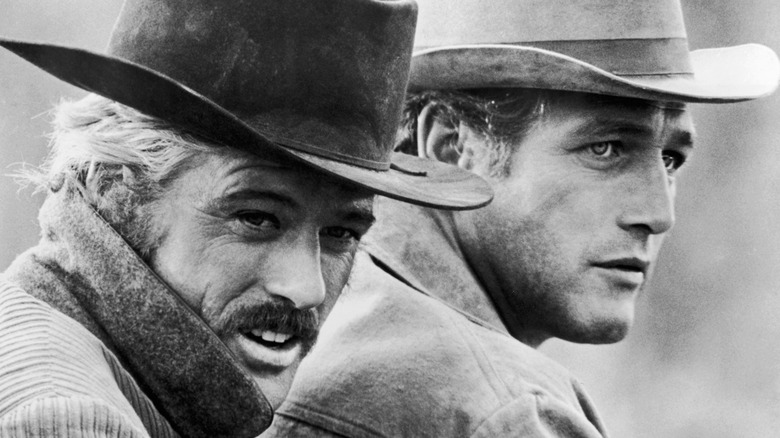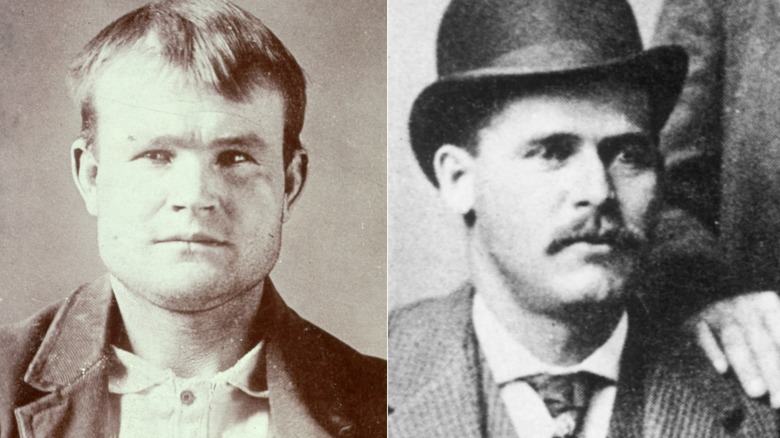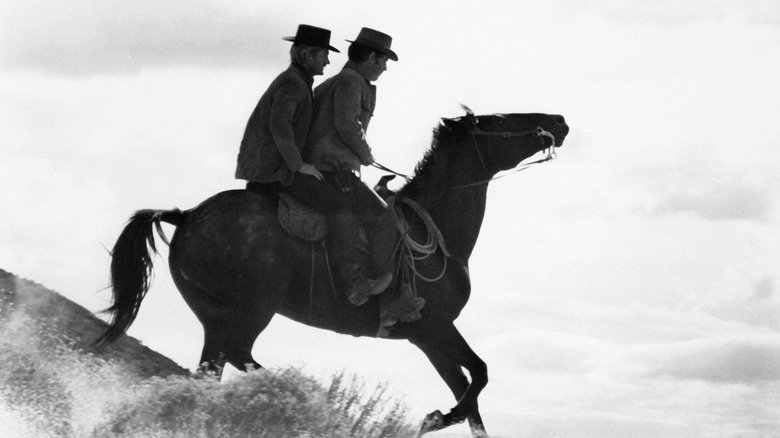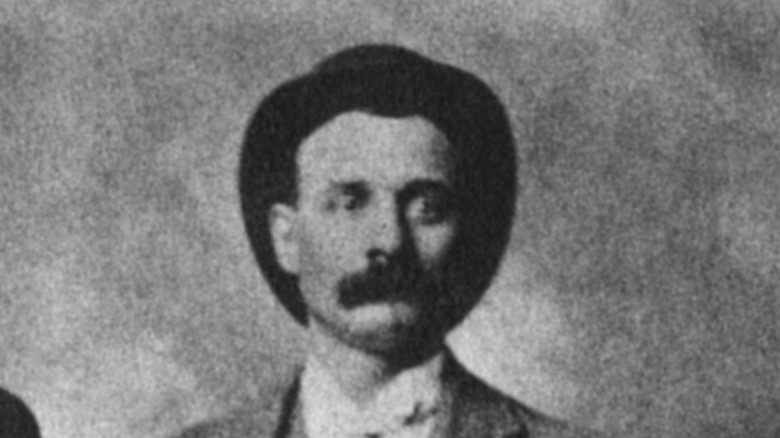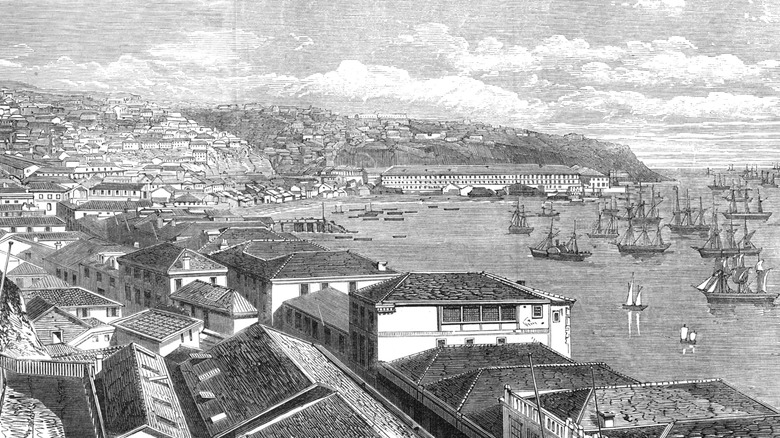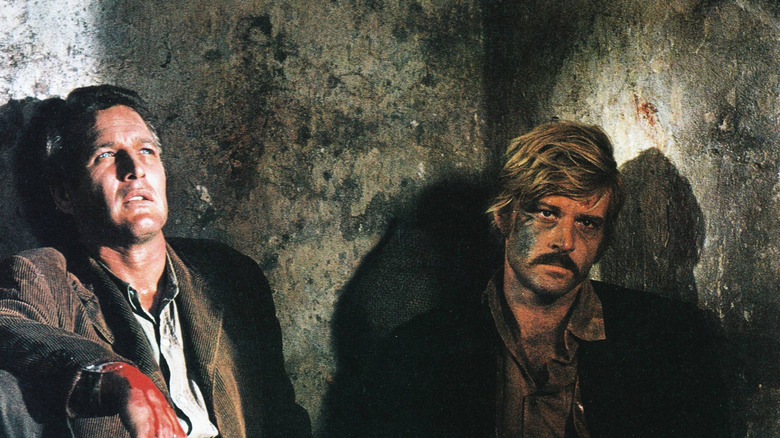Lies You Believe About Butch Cassidy And The Sundance Kid
They ran and ran, but not far enough. The two outlaws fled their native Utah for fresh hunting grounds, but the law in Bolivia has pinned them down in a hovel, and the army lies in wait for them. Wounded as well as trapped, the bandits talk half-seriously about fleeing to the outback of that infamous destination for the lawless, Australia. In the end, they opt to spring out from their hiding place in a hail of gunfire, doomed but defiant of the "straight" life to the end.
This is the end of Butch Cassidy and the Sundance Kid, as depicted by Hollywood in the 1969 film titled ... well, "Butch Cassidy and the Sundance Kid." The scene makes for a dramatic finale to a motion picture, to be sure, but it should come as little surprise that the outlaws' end didn't exactly play out that way. In fact, depicting any definitive end for Cassidy and the Kid would be a split from history, as we don't know for sure what happened to them.
But going out in a blaze of violence is just one of the stories told about Cassidy and his most famous partner. From their names to their motives, the facts of their lives are obscured by legends of the Old West. Here are a few of those myths, busted wide open.
Butch and Sundance weren't their real names
It doesn't take much detective work to figure out that "the Sundance Kid" was an alias. His real name was Harry Longabaugh. His more famous moniker came from his one and only arrest. Longabaugh was a thief from a young age, leaving home when he was 15. Sometime after, he was locked up in Sundance, Wyoming from 1887 to 1889 for horse stealing (per Britannica). By the time he left prison and took up with Butch Cassidy, the name "Sundance Kid" had stuck.
But Cassidy's name wasn't his own either; no part of his alias was. He was born Robert LeRoy Parker, to a loving if unorthodox Mormon family. He, too, discovered crime when young, though in his case, he was tempted by a rebellious cowboy: Mike Cassidy. It was in emulation of this shady mentor that Parker took the surname Cassidy when he left home (at 18, a little older than his future partner). His reason for the name change, per Biography, was to shield his family from his own reputation.
The front half of his alias, according to Cassidy himself, started as a joke. While on the run, he briefly worked as a butcher in Rock Springs, Wyoming. A fellow outlaw, Matt Warner, thought it was funny to call Cassidy "Butch" for the job. The nickname "Butch" Cassidy never left him.
They weren't best friends
It isn't just a Hollywood classic that suggests Butch Cassidy and the Sundance Kid were thick as thieves. The facts of their lives — riding together in a gang, fleeing together to Bolivia, allegedly dying together in a shootout — could lead anyone to believe they were the best of friends. But the evidence suggests that, of all the members of Cassidy's Wild Bunch gang, the Kid was his best gunman but not his closest confidante.
In his criminal life, Cassidy's best friend was a man named Elzy Lay, whom Cassidy met in his native Utah. Their relationship was close enough that it eclipsed Lay's own marriage; his wife asked him to stop riding with outlaws, and he refused, leading to a divorce after his 1899 arrest (per Utah.com). Lay and Cassidy were together for a number of years, and Lay was Cassidy's partner in working out the strategies and logistics for the gang's operations.
He didn't follow Cassidy and the Kid to Bolivia — he couldn't, being locked up for life for his part in a train robbery. But in 1906, he won himself a pardon by helping to put down a riot and rescuing the warden's wife and daughter in the process. Taking the name William McGinnis, he headed for Wyoming, established a ranch, and ended his days as a guide and a dabbler in geology, according to Brittanica.
Did Butch Cassidy really lead the Wild Bunch?
There's a perception of Butch Cassidy as riding at the head of a tight-knit posse, the Wild Bunch. "Butch Cassidy and the Sundance Kid" opens with him fending off a challenge to his leadership by the hulking, deep-voiced Harvey Logan. And in telling a story, there's a natural instinct to simplify and clarify. If Cassidy is the central character of the story, why wouldn't you present him as the leader?
But the Wild Bunch may not have been an organized gang. Per Britannica, it was more of a loose association of thieves who came together for various jobs, sometimes in pairs and sometimes as a group. To the extent that an informal confederation like this can have a leader, it may not have been Cassidy. It's widely accepted that he was, but a minority view among historians suggests that the real leaders and masterminds behind the Wild Bunch were Logan, also known as Kid Curry, and William "News" Carver. Indeed, there is limited evidence to suggest that contemporary lawmen took more note of Curry than of Cassidy, and even some to suggest that Curry and the Sundance Kid were better friends than the Kid was with Cassidy (per Mark T. Smokov's "He Rode with Butch and Sundance").
Whether he was the real leader or not, Curry made a lie of the oft-repeated claim that the Wild Bunch didn't kill. Cassidy may have abhorred violence, but Curry killed multiple people and, by some accounts, had to be held back by Cassidy from indulging in murder.
They didn't go to Bolivia to keep robbing
In "Butch Cassidy and the Sundance Kid," Cassidy puts the idea of moving to Bolivia into the Kid's ear early on. He imagines the country as the perfect place for a pair of outlaws, abounding in gold and full of easy pickings, and he and the Kid resume thieving almost as soon as they arrive. It's only a chance sighting of a lawman that compels Cassidy to go "straight," and even then, he and the Kid prove ill-suited to honest living and fall back into robbery before being cornered.
But Cassidy's motives for fleeing to South America may have been less adventurous and mischievous than resigned. Evidence suggests that, by the turn of the century, the famous outlaw was tired of his infamy. He may even have approached a lawyer in a doomed effort to secure a full pardon. When that fell apart, Cassidy, the Kid, and the Kid's lover Etta Place fled south by way of New York — to Brazil, not Bolivia, before settling in Argentina in 1901 (per Sol Salute). There, they established a ranch in Cholila, and seem to have settled down for a few years.
1906 is often given as the year Cassidy and the Kid fell back into outlawry, though it may have been just a little earlier. An investigation detailed in The Guardian suggests that Argentinian authorities had started looking for them by then. The Kid escorted Place back to America and, on his way back, either compulsively or accidentally shot a police officer, setting off his and Cassidy's return to crime.
We don't know how Cassidy or the Kid died
Butch Cassidy and the Sundance Kid probably died in Bolivia in 1908. They'd fled there after their trouble in Argentina, they'd been pinned down after robbing a payroll, and there are no ironclad reports of them after their alleged stand-off with Bolivian authorities. But if they died there, they didn't go out in a blaze of glory, a la "Butch Cassidy and the Sundance Kid."
Charles Leerhsen's "Butch Cassidy: The True Story of an American Outlaw" (via Pasatiempo) draws on contemporary reports out of Bolivia to portray an exhausted and pathetic end for the outlaws: shot down without fanfare by policemen as they lay in their holdout. Pinkerton reported in 1909 (per Britannica) that Cassidy died by suicide while the Kid died from injuries inflicted by the Bolivian cavalry. A variation on that story has Cassidy giving a mercy killing to the Kid before shooting himself.
But while there were two Anglo men cornered by the Bolivian authorities who died in 1908, their bodies were not conclusively proven to be Cassidy's or the Kid's, and no photographs were taken of the corpses. While written evidence still favors the famous outlaws' dying in Bolivia, the lack of concrete proof helped to fuel reports that they lived to be shot another day or even that they escaped back to America and carried on normal lives under assumed names. Cassidy's own family spread such stories and maintained that they kept in contact with him until 1937 when he supposedly died of natural causes.
